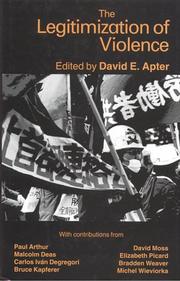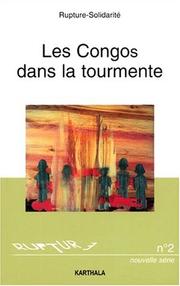| Listing 1 - 10 of 3559 | << page >> |
Sort by
|
Book
ISBN: 1787385795 9781787385795 Year: 2021 Publisher: London, England : Hurst Publishers,
Abstract | Keywords | Export | Availability | Bookmark
 Loading...
Loading...Choose an application
- Reference Manager
- EndNote
- RefWorks (Direct export to RefWorks)
Syria as we knew it does not exist anymore. However, all conflicts change countries and their societies. Such an obvious statement needs to be unpacked in specific relation to Syria. What has happened, what does it mean, and what comes next? In order to consider the future of Syria, it is crucial to assess not only what has been destroyed, but also how it was destroyed. It is equally vital to address the structural and possibly enduring results of large-scale destruction and displacement. These dynamics are not only at play in Syrian society, but are tearing at the economic fabric and very territorial integrity of the country. If war is a powerful process of human and material destruction, it is equally a powerful process of spatial, social and economic reconfiguration. Nor does it stop at national borders—the unravelling of Syria, and of the idea of Syria, has affected and will continue to affect the entire Middle East. War-Torn explores these transformations and the processes that fuel them. It is an indispensable account throwing light on neglected aspects of the Syrian war, and a much-needed contribution to our understanding of conflicts in the twenty-first century.

ISBN: 9780814706480 0814706487 Year: 1997 Publisher: New York: New York University press,
Abstract | Keywords | Export | Availability | Bookmark
 Loading...
Loading...Choose an application
- Reference Manager
- EndNote
- RefWorks (Direct export to RefWorks)
Book
ISBN: 270612234X 2706122331 2706123230 Year: 2015 Publisher: FONTAINE (15, rue Abbé Vincent, 38600) : Presses universitaires de Grenoble,
Abstract | Keywords | Export | Availability | Bookmark
 Loading...
Loading...Choose an application
- Reference Manager
- EndNote
- RefWorks (Direct export to RefWorks)
Auch, Compiègne, Le Creusot, Valence… font partie de la centaine de sites universitaires implantés dans des villes moyennes. Les acteurs locaux se sont mobilisés pour développer des activités de formation, de recherche et de transferts de technologie en lien avec les besoins d'un territoire. Mais, confrontés aux enjeux d'une économie de la connaissance compétitive et recentrée sur les métropoles, ces sites sont aujourd'hui mis au défi de l'approche rationnelle et pragmatique de la gestion budgétaire des universités. Outils de la démocratisation de l'enseignement universitaire, du développement local et de l'équité territoriale, quel peut être leur rôle dans la politique académique et scientifique ainsi que dans la responsabilité sociale et territoriale des universités ?
Book
ISBN: 9780198825036 019882503X Year: 2020 Publisher: Oxford: Oxford university press,
Abstract | Keywords | Export | Availability | Bookmark
 Loading...
Loading...Choose an application
- Reference Manager
- EndNote
- RefWorks (Direct export to RefWorks)
The Middle East today is characterized by an astonishingly bloody civil war in Syria, an ever more highly racialized and militarized approach to the concept of a Jewish state in Israel and the Palestinian territories, an Iraqi state paralyzed by the emergence of class- and region-inflected sectarian identifications, a Lebanon teetering on the edge of collapse from the pressures of its huge numbers of refugees and its sect-bound political system, and the rise of a wide variety of Islamist paramilitary organizations seeking to operate outside all these states. 0The region's emergence as a 'zone of violence', characterized by a viciously dystopian politics of identity, is a relatively recent phenomenon, developing only over the past century; but despite these shallow historical roots, the mass violence and dispossession now characterizing Syria, Lebanon, Israel/Palestine, and Iraq have emerged as some of the twenty-first century's most intractable problems. In this study, Laura Robson uses a framework of mass violence - encompassing the concepts of genocide, ethnic cleansing, forced migration, appropriation of resources, mass deportation, and forcible denationalization - to explain the emergence of a dystopian politics of identity across the Eastern Mediterranean in the modern era and to illuminate the contemporary breakdown of the state from Syria to Iraq to Israel.
Book
ISBN: 9961854039 Year: 2000 Publisher: Alger : Editions le matin,
Abstract | Keywords | Export | Availability | Bookmark
 Loading...
Loading...Choose an application
- Reference Manager
- EndNote
- RefWorks (Direct export to RefWorks)

ISBN: 284586115X Year: 2000 Publisher: Paris : Karthala,
Abstract | Keywords | Export | Availability | Bookmark
 Loading...
Loading...Choose an application
- Reference Manager
- EndNote
- RefWorks (Direct export to RefWorks)
Book
ISBN: 0837198453 Year: 1978 Publisher: Westport (Conn.) : Greenwood press,
Abstract | Keywords | Export | Availability | Bookmark
 Loading...
Loading...Choose an application
- Reference Manager
- EndNote
- RefWorks (Direct export to RefWorks)
Book
ISBN: 0801410177 Year: 1976 Publisher: Ithaca (N.Y.) : Cornell university press,
Abstract | Keywords | Export | Availability | Bookmark
 Loading...
Loading...Choose an application
- Reference Manager
- EndNote
- RefWorks (Direct export to RefWorks)
Book
Year: 2011 Publisher: Firenze, Italy : Firenze University Press,
Abstract | Keywords | Export | Availability | Bookmark
 Loading...
Loading...Choose an application
- Reference Manager
- EndNote
- RefWorks (Direct export to RefWorks)
This book, which is the result of a project of Research of Relevant National Interest (PRIN 2007), presents an overview of theoretical-political thought as a challenge to centralism, starting from the late Middle Ages and the Modern Age through to the twentieth century. As against a 'vertical' vision of European politics which, from Machiavelli to Mosca, favours the hierarchical nature of power relations, the essays collected here are presented as a number of brief chapters in the history of the 'horizontal paradigm' in European political thought. They demonstrate the wealth and the persistence of a tradition and of the myriad experiences and theorisations that have, in effect, proposed forms of decentralisation and of association frequently coexisting with centralism, as in the case of the autonomies within the system of the great national states.
Book
Year: 2020 Publisher: Paris, France : Agence française de développement,
Abstract | Keywords | Export | Availability | Bookmark
 Loading...
Loading...Choose an application
- Reference Manager
- EndNote
- RefWorks (Direct export to RefWorks)
La littérature consacrée aux déterminants de la prise d'armes au Sahel privilégie les causes socio-économiques et, en second lieu, sécuritaires : un consensus relativement large émerge autour de la marginalisation de certaines communautés d'un côté et, de l'autre côté, des conflits autour des ressources naturelles, en tant que facteurs principaux de la prise d'armes au Burkina Faso, au Mali et au Niger. Les facteurs identitaires - personnels et communautaires - sont également retenus comme importants pour toutes les catégories de groupes armés, mais ils apparaissent secondaires, tout comme l'« appât du gain », et n'expliquent pas de manière autonome la mobilisation armée. Le rôle des déterminants religieux et idéologiques est quant à lui décrit comme négligeable par l'ensemble de la littérature analysée, avec peu d'exceptions. Cela pose question notamment en ce qui concerne l'engagement dans les groupes armés djihadiste, analysé comme peu différent de l'engagement dans les autres groupes. Le mobile religieux est ainsi considéré comme un facteur somme toute marginal : dans les cas où celui-ci est revendiqué par les acteurs locaux, la majorité des études examinées le « décompose » systématiquement en « sous-déterminants » socioéconomiques ou identitaires. Trois remarques conclusives peuvent être avancées : en premier lieu, la prévalence des déterminants socioéconomiques dans la prise d'armes au Sahel apparaît nette - bien qu'avec quelques nuances. En second lieu, la violence semble suivre une logique d'autoreproduction qui est désormais relativement disjointe des déterminants originaires. En d'autres termes, si les multiples déterminants analysés subsistent dans les ralliements aux groupes armés, on pourrait avancer que le phénomène auquel on assiste au Sahel est celui d'une autonomisation de la violence des singularités des contextes de terroir. Enfin, la relativisation des facteurs idéologiques et religieux est le constat essentiel de cette revue de littérature. Une approche réductionniste semble prévaloir : sans remettre en question la centralité des déterminants socio-économiques, la problématisation du mobile religieux adoptée semble négliger les « logiques intrinsèques » du religieux, notamment dans le contexte sahélien où les enchevêtrements entre politique et religion ont pris le devant de la scène depuis les années 1990.
| Listing 1 - 10 of 3559 | << page >> |
Sort by
|

 Search
Search Feedback
Feedback About UniCat
About UniCat  Help
Help News
News